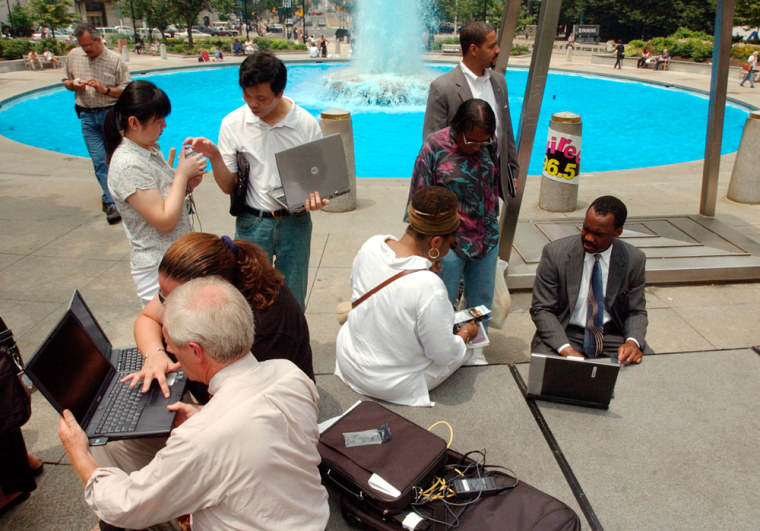Philadelphia's plan to offer inexpensive wireless Internet as a municipal service -- the most ambitious yet by a major U.S. city -- has collided with commercial interests including the local phone company, Verizon Communications Inc.
In fact, a bill on Gov. Ed Rendell's desk that could humble Philadelphia's ambitions began 19 months ago as a proposal drafted by lobbyists for telecommunications companies.
Regional and long-distance phone companies, who sell broadband Internet to consumers and businesses, have in recent months intensified a national campaign to quash municipal wireless initiatives like Philadelphia's as dozens of cities and towns have either begun or announced such plans -- from San Francisco to Chaska, Minn., to St. Cloud, Fla.
Telecommunications companies are doubly worried because hundreds of other municipalities provide broadband service over cable or telephone lines.
The idea of cheap, municipally provided Internet as social leveler is particularly appealing to big city politicians.
"We looked at it as a way to be a city, literally, of the 21st century," said Barbara Grant, a spokeswoman for Philadelphia Mayor John F. Street. "We wanted to bridge the digital divide for residents who wouldn't have access to the Internet, particularly schoolchildren."
Plus, the service could help make Philadelphia "hip" enough to stem the outward flow of college graduates, she said.
Industry cites unfair competition
But the telecoms industry, its business in turmoil as such disruptive technologies as Voice over Internet calling turn traditional revenue models on end, calls such public-sector projects unfair competition.
In the past year, companies including Qwest Communications International Inc., Sprint Corp., BellSouth Corp., and Verizon Communications Inc. have pressed for legislation in Pennsylvania, Florida, Utah, and Louisiana that would extract concessions from public-sector telecommunications ventures.
A chief complaint: a city can draw on taxpayer dollars, while a private company has to pay interest on borrowed capital. Also, the telecoms complain, public-sector projects are subject to far less regulation.
"Verizon has always been pro-competition if all of the competitors that are providing the same kind of service are governed by the same regulations," said spokeswoman Sharon Shaffer of Verizon, the state's largest phone company and Philadelphia's dominant provider.
The bill that reached Rendell's desk over the weekend originally included a provision that would bar "political subdivisions" in Pennsylvania from providing telecommunications services for a fee.
It was tucked into a larger, 30-page bill drafted by industry lobbyists to give telephone companies financial incentives to quicken the rollout of broadband networks -- a carrot worth as much as $3 billion to Verizon.
As the bill evolved, House lawmakers softened the provision to allow the public-sector projects if the traditional local telephone company first declined to provide the service.
2006 deadline for city
In the days before the Senate approved the bill early Friday morning, Philadelphia's wireless advocates discovered the provision and cried foul. In response, senators changed it to allow services operating before Jan. 1, 2006, to continue, giving Philadelphia some time to get going.
Consumer advocates say cheap Wi-Fi fills a need the private sector has no intention of meeting.
"They're saying, 'You provide it to any place we can't or won't, but you can't charge a fee,'" said Edward Schwartz, a consumer advocate and member of Philadelphia's wireless task force. "How does that work?"
Rendell, a former Philadelphia mayor, has until Nov. 30 to veto the bill, and hasn't yet said what he plans to do.
If he signs the bill, it would add Pennsylvania to the dozen or so states that regulate public-sector telecommunications projects or ban it outright. Such laws have been upheld by the U.S. Supreme Court.
Philadelphia city officials had said they planned to introduce the service in the summer of 2006, offering it for free or at costs far lower than the $35 to $60 a month charged by commercial providers, said the city's chief information officer, Dianah Neff.
Now, they may have to move more quickly.
"It would be difficult, but not impossible to have it by January 2006," Neff said.
Neff and others are now studying options for business models that could comply with the legislation. The city could award a franchise to a private company or nonprofit to operate the service. Or it could raise money through advertising or private donations instead of charging a subscriber fee.
The projected cost for installing antennas across the city's 135 square miles would be $10 million and another $1.5 million annually to maintain it, Neff said.
The industry's aggressive lobbying notwithstanding, at least one wireless advocate predicts public-sector wireless access will be impossible to squelch.
"Once the genie is out of the bottle," said Greg Richardson, a consultant on the Philadelphia wireless project, "it's very difficult, if not impossible, to put it back in."
